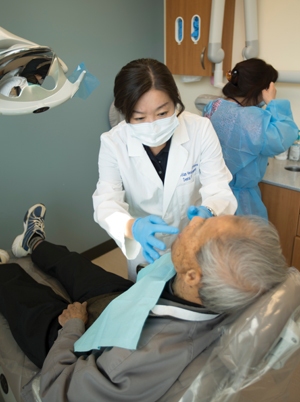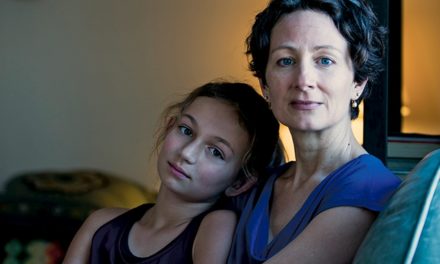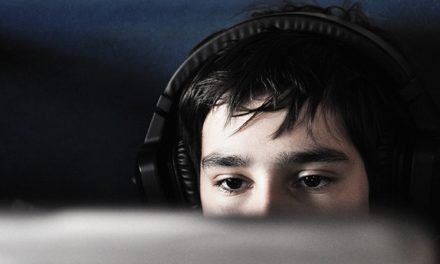Joyce Chen, DDS, supports depression screenings at Asian Health Services dental offices.
Click Here to Check out the Best Dentists in Oakland
The nonprofit prides itself on its services for “the body, mind, and teeth.”
The patient sat in the dental clinic waiting room, filling out her check-in forms. Her dental team knew she was elderly and Chinese American, didn’t speak English, and lived alone. The team members didn’t know she was struggling with depression.
But sandwiched among the pages of dental and medical history and insurance information was a depression screening form, providing a platform where her cry for help could be heard. At the bottom of the form, she scribbled in Chinese, “I have thought about killing myself.”
“This was literally the morning after we started the depression screening,” said Dr. Huong Le, the head of dental health at Asian Health Services, an Oakland health care provider primarily serving low-income, limited English-speaking Asian immigrants and refugees. Her eyes widened as she recalled the moment that she saw the patient’s note. “I got on the phone and called [our behavioral health director]. She said they’d see the patient that day,” Le said.
Suicide is the fourth leading cause of premature death among Asian Americans in Alameda County, according to the 2014 Alameda County Health Data Profile. Mental health disorders like depression are a widely known risk factor for suicide. Asian-Americans have depressive symptoms at rates that rival or are up to three times greater than the general population, according to research published in the Journal of the American Society on Aging. Yet they are half as likely to seek professional help for mental health issues, reported a study published in the American Journal of Public Health.
Asian Health Services prides itself on its “whole patient health” model, or, as Le put it, services for “the body, mind, and teeth.” Patients receive primary care, mental health services, social services, and dental care. In 2014, Le and other Asian Health Services leaders brainstormed how to take a more holistic approach to behavioral health for seniors, a group prone to depression risk factors such as social isolation, due to cultural and language barriers. The suicide rate for Asian and Pacific Islander women ages 65 to 84 is slightly higher than the national average for women in that age bracket, according to an analysis of CDC data by psychology researchers at the University of Indiana, Bloomington.
Asian Health Services had already started screening patients for depression during primary care visits earlier in 2014. But according to Le, up to 20 percent of dental clinic patients don’t regularly visit their primary care doctor, so in July that year, she and other Asian Health Services leaders devised and implemented a safety net to capture some of these patients who weren’t being screened at primary care visits.
The program is simple: Add a depression screening form to the dental check-in process for patients over 65 years old. If patients are willing to complete the form, and mark “yes” to any depression symptom, the dentist asks them if they would accept a referral to a behavioral health provider. If they do, the clinic faxes the form to Asian Health Services’ behavioral health department, which then calls the patient to schedule an appointment.
Additionally, dental clinic front desk staff, dental assistants, and dentists were trained during a staff meeting on how to recognize depression symptoms and where to refer patients exhibiting these symptoms. “Some of the elderly patients tell me they feel useless. I didn’t know where to send them before the training,” said Vicky Wu, a front desk staffer. “Now, I tell them that ‘we have someone who can help you.’”
The dental clinic serves 6,500 patients across six sites, including three schools. In 2017, 1,000 seniors received dental care at Asian Health Services. Over 400 of them were screened for depression, and approximately 10 patients accepted a referral to a behavioral health provider, according to Le.
Le said that the dental clinic can’t track what happened to these patients after they accepted a referral, because behavioral and medical health information reside in a separate electronic system from dental information.
Her vision is for any patient visiting a dentist at Asian Health Services to be screened for depression and to see a mental health professional at the dental clinic if they have any symptoms, so that no one falls through the cracks. “If someone is having a crisis, we should be able to walk them into a counseling room right away,” she said.
She has overseen the completion of two steps critical to achieving her vision. In 2016, Asian Health Services won a $1 million grant from the federal government to open a new dental clinic with a physical space for behavioral health counseling, and last year, Kaiser Permanente awarded the clinic a $100,000 grant to hire a behavioral health counselor. The clinic is searching for a candidate, although Le said that finding a bilingual behavioral health counselor has been challenging, given the lack of supply.
It’s critical to meet people where they are, said Le, because Asian-Americans face a unique set of cultural barriers to getting screened and treated for depression.
“Admitting that you have depression may seem like you’re telling people that you’re weak. Culturally, we just don’t talk about feelings,” said Jackie Wong, director of behavioral health at Asian Health Services, referencing her own experience as an Asian American. “My parents didn’t hug me or talk about emotions to express their love. They would do something, like cook for me.”
Some Asian Americans don’t know that depression is treatable. “In the Chinese culture, depression is just seen as having a low mood — not necessarily something that needs to be treated,” said Donna Jung, a medical social worker at Asian Health Services.
Language and transportation barriers also prevent some people from taking advantage of social services that can reduce isolation. “I know a woman who only spoke Cantonese,” said Jung, describing a patient who lived 30 miles outside Oakland. “She was lonely, so we wanted her to get out of her house to socialize. But there were no Cantonese services she could access in her area without her daughter to drive her.”
Dentists at Asian Health Services have championed the depression screening program because they believe screening and treating depression is not only ideal for mental health but may also ultimately enable better oral health. “There’s a higher risk of tooth decay with depression,” said Dr. Joyce Chen, a dentist with 15 years of experience at Asian Health Services. Moreover, she noted, the screening program took minimal time to implement and doesn’t disrupt her workflow.
Word about the program is getting out in the dental community. A large dental school recently contacted Le to learn more about the screening program. “We’re the first to do this, so they want us to share our experience,” she said.
















